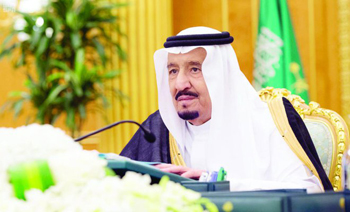Riyadh, Apr 25: The Cabinet on Monday threw its support to the Arab finance ministers in their call for diversification of income sources and to promote inter-Arab investments during their meeting in Rabat.
 The Cabinet also gave their support for the finance ministers’ urging to improve the regional business environment, enhance regional economic integration and attract foreign investments.
The Cabinet also gave their support for the finance ministers’ urging to improve the regional business environment, enhance regional economic integration and attract foreign investments.
The Cabinet’s endorsement occurred during its regular weekly meeting presided over by King Salman at Al-Yamamah Palace.
Members also focused on the Kingdom’s permanent position at the UN Security Council in its support to the Palestinian people to obtain their rights including self-determination and the establishment of an independent Palestinian state on the occupied Palestine lands, including Al-Quds, in accordance with the UN Charter and its resolutions. They also formally recalled for the record the Kingdom’s call for the Israeli withdrawal from all occupied Arab lands and to stop building settlements on the Palestinian lands since they are illegal settlements and detrimental to peace.
In other matters, the Cabinet expressed Kingdom’s thanks to the Iraqi government for its efforts in releasing the kidnapped Qataris and two Saudis.
Cabinet members also expressed the Kingdom’s strong condemnation of the terror attacks at a military base in Afghanistan, which resulted in a number of deaths and injuries, and another one that killed a police officer in Paris.
Locally, the Cabinet expressed thanks and appreciation to King Salman for issuing royal decrees on the new appointments in a number of government agencies.
The Cabinet said the restoration of the suspended or canceled financial allowances for civil servants and military personnel, based on the recommendation of deputy crown prince, demonstrated the king’s willingness to care for the public.
The king expressed thanks and appreciation to former officials for welcoming the newly-appointed officials.
The Cabinet also lauded the king’s directives on the establishment of the national security center and the payment of two months’ salary for participants in the frontlines of the “decisive storm” and “restoration of hope” operations of the personnel of the ministries of interior, defense, national guard and public intelligence.
The Cabinet also praised the king’s decision on ending exams of the second term for general and higher education before the start of the holy month of Ramadan. The decision, the Cabinet said, showed cohesion between the leadership and citizens.
Later, the Cabinet approved a series of decisions.
The Cabinet approved a memo of understanding between the ministries of health of Saudi Arabia and South Korea for cooperation in the health areas.
The Cabinet authorized the minister of labor and social development to discuss with the South Africa a draft memo of understanding on labor issues between two countries.
The Cabinet authorized the minister of transport and board chairman of the General Authority of Civil Aviation (GACA) to sign two draft agreements between Saudi Arabia and the governments of Benin and Djibouti in the area of air transport services.
The Cabinet approved a cooperation agreement on sea transport and seaports between the Saudi and Egyptian governments.
The Cabinet approved a memo of understanding for cooperation in agricultural areas between the Saudi and Egyptian ministries of agriculture.
The Cabinet agreed that the appointment of members of board of directors of Saudi Basic Industries Corp. (SABIC), who represent the government including board chairman and his deputy, be made through the general assembly of the company.
The Cabinet agreed the continuation of payment of overtime work for those occupying health jobs in hospitals, medical centers and labs at 20 percent for three years.
The Cabinet approved amendments on some articles of the Officer Service System.





Comments
Add new comment